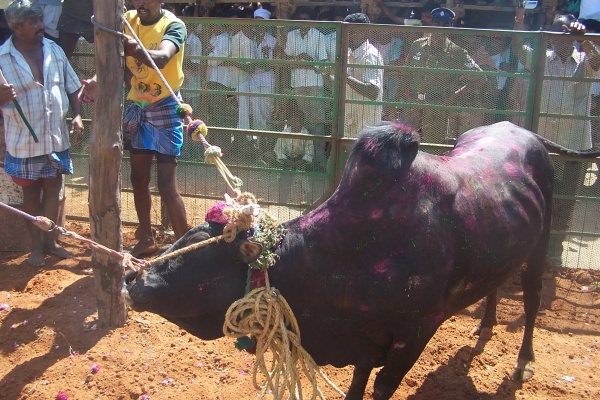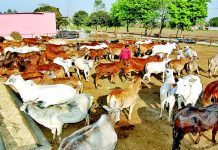This article is written by Gitika Jain pursuing BBA.LLB (Hons.) from Amity University, Kolkata. This is an exhaustive article which deals with legal restrictions on the religious slaughter of animals.
Table of Contents
Introduction
Animal liberation and animal rights, are basically an idea to protect the interests of animals such as to protect them from sufferings. Mere passing of laws will not help in balancing the approach of humans towards non-humans, proper implementations are required. Even before the modern civilization stepped into, penalties were written down in various parts of human beings to animals in order to protect the non-humans whose existence was necessary for everyone. People often are insensitive to the pain of the animal simply because they don’t speak the language of humans and they don’t have a voice to raise against the torture on them. There is not a single day in the world where animals don’t have to fight for their living. They are chained, beaten and enslaved in order to perform for human “entertainment”. However, it is not necessary that everyone who abuses animals do it with that purpose. Many of them do not even realise what they are doing or how cruel they are being. In order to make them realise their mistakes, it is important to conduct a program that instils amongst people the feeling of pain that animals suffer and how dangerous it can be to abuse animals from next time onwards.
Concept of animal cruelty
The term ‘animal cruelty’ is also known as ‘animal abuse’ which is also a legal term that is described as an act against law. The term abuse means cruel behaviour or bad behaviour with an intention to wrongfully use animals. We can also describe animal abuse as a violent action against them with a specific gain such as killing them for food or cloth or any other parts used for making many useful products for using them for the purpose of entertainment. Examples can be using elephants for ivory tusks, cobra for skin, rhino for horn and other body parts, etc. More than 230 million egg-laying hens are confined in cages in India for their entire lifetime. Slaughtering of cows and buffaloes, that are used for dairy production and are no longer making profits in that zone, is done. These animals are transported from places to places by illegal means.
Ancient Indian legislation
There are specifically scripted rules that lay down the behaviour of do’s and don’ts of humans to animals in 15,000 years old Manusamhita. The major intention with which the script was framed was the role of mankind in animal welfare. Some of the rules are:
- According to Sloka 229 of Manu Samhita, in cases where any dispute arises between the master and the cowboy regarding the duties and arbitration should only be done according to the rule of the religion.
- Sloka 230– During the time when the caretaker is under the responsibility of the animals, any harm that happens to any animal, and in cases where that harm results in the death of the animals, the master will be held responsible if that happened during the night time, otherwise the caretaker will be held responsible.
Likewise, there are different Slokas under Manu Samhita which lay down the dos and don’ts of human behaviour to animals.
Modern Indian legislature
Enrichment of civilisation has always been unique and a great point for India and modern thinkers have tried to script down the rules to protect the already existing and enriching civilization. In the last two decades, the major emphasis has been laid down in areas like environmental ethics, animal ethics, education of the backward section of the society, etc. The modern approach emphasizes on the fact that animals should no longer be considered to be used as food, clothing, research subjects or entertainment. There are various important Sections and Acts enacted by the government of India in order to protect animals and mitigate violations against them:
- Section 268, 269, 270, 379, 428 and 429 of IPC 1860.
- Wildlife Protection Act of 1972.
- The Prevention of Cruelty to Animals Act 1960.
Indian Penal Code
Section 269 and 270 of IPC states that a negligent act can be said as something which spreads dangerous disease to life. If any animals that are not registered for the purpose of sale or for the purpose of killing them are being killed then under the Section a person can file a charge sheet to prohibit such killings. If in a public place, there happens to be killing of an animal, it will amount to public nuisance and will attract a penalty under Section 268 of IPC. Unnecessary pain and suffering is a penal offence and is prohibited under Sections 379, 428 and 429. Section 2(3) of the Indian Penal Code states the duty of every civil person that is to act responsibly for the well-being of animals and prevent cruelty against them. When this offence has been committed by a person for the first time they will have to pay a maximum fine of rupees 50 but if the same offence has been repeated twice or thrice within 3 years of the previous offence then the fine will not be less than 25 rupees but it may extend to 100 rupees or imprisonment for a term which may extend to three months or both.
Wildlife Protection Act, 1972
This is an important act that prohibits any injury to wild animals under Section 39. In this act, the term animal includes birds, reptiles, amphibians, and mammals and their young. The eggs of these reptiles and birds are also included in the definition. Penalties have also been provided under Section 51 for the person who is considered to have committed an offence under this act with an imprisonment of three years or fine of 25000 rupees or both. In case if a person commits the same offence for the second or third time then there will have to be a punishment of imprisonment of 7 years with a fine of 10000 rupees. Moreover, if a person is blamed for killing a snake it is a non-bailable offence according to this act.
Prohibition of the sacrifice of animals and laws related to it
Sacrificing of animals is an illegal act that is provided under some laws in India. They are the Local Municipal Corporation Act 1882, Prevention of Cruelty to Animals Act 1960, Wildlife Protection Act 1972, and the Indian Penal Code. The municipal corporation acts have given the power to the municipality to restrict the slaughtering of animals within a corporation area other than those who have licenced butcher houses. It is even illegal to slaughter animals in places where there are temples and other public streets.
Prevention of Cruelty to Animals Act, 1960
This act is the most comprehensive act passed in India in recent times to prevent any unnecessary pain or suffering on the part of animals. It prohibits any kind of cruelty to animals.
Apart from India, there are several other countries where there are legal restrictions on the slaughtering of animals. They are:
- Australia– Generally Australia profile bits killing of animals without stunning. If killing without stunning is mandatory for any religious purpose then permission must be obtained for the same and the ritual slaughter must only take place in the licensed slaughterhouses. Additionally, permission can only be granted if:-
- Rituals slaughter can only be done by the person who has the knowledge and skills to do it
- This can only be performed in front of a veterinarian who is an inspector of slaughtering and meat.
- The equipment used for slaughtering must be licensed
- The animals for ritual slaughter should only be brought to the position required after the person is ready to perform the stunning.
- Belarus- The local governors of this place prohibit the offering of animals in public places and insist on religious slaughtering to happen in an unauthorised way.
- Belgium- In Belgium the religious slaughtering is not prohibited at a federal level but there are few regions who have adopted the practice to prohibit this. The parliament of Wallonia, the Flemish parliament, and the Brussels-capital region are the three places that prohibited the practice of religious slaughtering.
- Cyprus– In Cyprus before slaughtering animals are required to be stunned but there is an exception in cases where religious methods of slaughter are adopted.
- Denmark- Being a member of the European Union and having a population of 5.8 million the new animal welfare protection introduced by Denmark related to slaughter was commendable. There is an act called Denmark’s Animal Protection Act according to which animals must be slaughtered as quickly and as painlessly as possible.
- Estonia- Estonia’s animal protection law controls the slaughtering of animals for religious purposes and requires post-cut stunning.
- Poland – Slaughtering animals without studying has been prohibited in Poland.
- Russia – Russia’s National legislation remains silent regarding the protection of animals and slaughtering them for religious purposes just as the case in Georgia.
- Slovenia- Slovenia Animal Welfare Act banned all ritual slaughter of animals after its amendment in 2012.
- Sweden – There are no statistics that have been provided for religious affiliation in Sweden but without prior sedation in 1937 Sweden banned slaughter.
- Norway- Norway has a population of 5.3 million where there are 30,000 Muslims and 1200 Jews, so there is an act in Norway for animal welfare under which the slaughter of animals is regulated and which provides that sedation must take place prior to slaughter of animals. However, the import of Kosher and Halal meat are allowed by Norwegian laws.
- Switzerland- Previously killing of vertebrate animals with outstanding was prohibited in Switzerland but when animal welfare regulation was amended, an exception was added that allowed ritual slaughter of poultry with stunning. Anyone who seems to violate the provisions of animal slaughters were required to pay a fine of up to $ 21,371.
Apart from these countries, there are various others that have their rules and legal restrictions set regarding slaughtering of animals for religious purposes.
Conclusion
In a democracy, where everyone has the right to raise their voices against anything wrong there are still certain topics on which no one can give proper answers to the masses because of differences in opinions, views, and ideas by different persons and the experiences they had in the past. Such one topic can be debated relating to the slaughtering of animals and it is undoubtedly one of such topics which fall under this category. The constituent assembly did not provide for any nationwide enactment on this topic because of the diversity of religions being practised in different corners of the world. Even if this gap of not providing nationwide in a comment on this particular subject is fulfilled it will lead to an aggravated act of violence throughout the country.
Therefore the best alternative to this is to leave the issue as it is upon the individual states. One such example of diversity can be, there has been a ban on consumption of beef in Maharashtra but the neighbouring state of Goa which is ruled by the same party has no such ban because of the fact that the Christian population is more in Goa compared to Maharashtra. Therefore in a country like ours, it is next to impossible to satisfy the expectations of each citizen. Behind formulating every law there is a particular objective and unless and until that objective is achieved the very purpose of framing the law becomes useless. Thus the enactment of laws related to the slaughter of cattle in different states by different representatives and its confirmation with the judicial system is very important considering the essence of socialism that has been enshrined in our preamble. The ongoing criticisms, scrutinisation, and debate of the public on various laws passed within their states is an ongoing feature of a democratic country. But caution must always be emphasized on such debates in order to avoid any risk as to the security of the constitutional institutions. All these changes and amendments from time to time will, therefore, lead to the growth and development of democracy in the long run and will make sure that the faith we have in the pillars of our democracy is not easily misplaced.
References
- https://shodhganga.inflibnet.ac.in/bitstream/10603/200689/5/05_chapter%20ii.pdf
- https://eduindexnews.com/2020/07/30/legal-restrictions-on-religious-slaughter-of-animals/
- https://www.latestlaws.com/articles/beef-ban-in-india-legal-perspective-by-aayush-akar/
- https://www.worldometers.info/world-population/norway-population/
- https://www.statista.com/statistics/570212/total-population-in-denmark/
LawSikho has created a telegram group for exchanging legal knowledge, referrals and various opportunities. You can click on this link and join:
 Serato DJ Crack 2025Serato DJ PRO Crack
Serato DJ Crack 2025Serato DJ PRO Crack











 Allow notifications
Allow notifications


